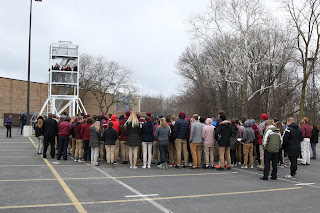Day 13: Am I liberal? And other questions about God in schools
I often listen to the local talk radio shows in the morning on my drive to school. The one that comes in most clearly is from the capital city an hour down the road, and the morning commentators are an extremely conservative bunch. Sociologically speaking this is somewhat singular, as urban areas tend to be more left-leaning in political views, while rural areas tend to be more right-leaning in politics. Anyhow, as I have always been much more conservative in my views, I was surprised to find myself disagreeing with nearly everything they said this morning. They were discussing several news stories regarding public schools.
One was about a girl who wrote an essay for her English class that was supposed to describe her idol. She chose to write about God, and the teacher asked her to redo it. Her corrected essay was about Michael Jackson. The girl's mother got upset and went to the principal and it is now national news. The commentators blasted the teacher, saying she needed to be instructed in the Constitution and the founding principles of our country, and possibly be sued for limiting this student's right to free speech.
I found myself thinking about what I would do in that situation. While I do take some issue with the term "idol" as opposed to "role model," I found myself in similar circumstances last week. We were brainstorming leadership qualities in my American Lit class in preparation for discussing the Iroquois Constitution, John Smith's "General History of Virginia," and William Bradford's "Of Plymouth Plantation." I asked them to write down someone they knew personally whom they viewed as a leader, and to describe that person. One boy wrote down "Jesus." I did ask him to choose someone else; not because I am anti-Christian (quite the contrary), but because it didn't fit the purposes of the assignment.
It is not that this student could not "know" Jesus personally. If I said, "It should be someone you talk to regularly, and who talks back to you," he could easily respond, "Well, I talk to Jesus every night." There are plenty of books that are written about Jesus being a charismatic leader; I myself own several titles, such as Jesus, C.E.O. However, the purpose of my brief exercise was not to quibble over semantics; rather, since the discussion lead to questions such as, "Who has the right to rule?" and "How could a good leader improve this situation, or a bad one hinder it?", using Jesus as an example may not be the most effective model. I really sought a discussion about the fallibility of leaders; unfortunately, Jesus doesn't fall into that category. I had to be careful about how I worded my response to the student though; it could easily turn into the situation in which the Memphis teacher finds herself. I can see it now: "English teacher tells student Jesus is not a leader." And then I'm on the talk radio agenda.
~~~~~~~~~~~~~~~~~~~~~~~~~~~~~~~~~~~~~~~~~~~
Another story the radio personalities addressed was how a Houston, TX, school district was piloting an initiative that awarded students $100 gift cards for each of their peers they could bring into school by September 30 - fellow teens who had dropped out of high school, or simply not registered in August. The goal was to lower the dropout rate; the commentators accused the district of only wanting "butts in desks" because they get government dollars per enrolled student. They reasoned that program should be dropped immediately because of its dishonest motives to get crummy students into the classroom to further lower the academic achievement of students who want to learn.
I completely disagree. As someone "in the trenches," as my mentor teacher calls it, I cannot believe the district has such simplistic motivation. I have seen students drop out, claiming they're going to get their GEDs. They rarely follow through, and it's not uncommon to hear stories of them now in prison because they sold meth, or some other unsavory job which doesn't require a high school diploma.
The personalities asked viewers, "Why should teachers have to teach kids that don't want to learn?" I wanted to ask, "Have you ever BEEN to a high school?" I teach AP - the kids who want to go to college - and 80% of them don't come to school jumping with joy to learn every day. This idea that the kids who show up want to learn, and the kids who don't, drop out, is a fallacy. Dropping out is not about lack of learning; a lot of factors go into that decision, and kids who do it often have better reasons than "not wanting to learn." I thought a district who paid students per referral was actually rather creative; I'm not sure I would promote such a plan in my district, but I appreciated the willingness to think outside the box. It's not as if they're paying the truants themselves to attend school; just their friends who know their situation and are very persuasive. At any rate, I found myself disagreeing with the conservative hosts, leading me to wonder if my beliefs about public education have shifted to a more liberal viewpoint after actually being a high school teacher in a poorer, rural district.
I started reading a novel this week called Village Books by Craig McLay. The narrator argues that everyone should spend at least some time in his life working in retail to learn to appreciate the man behind the counter and not abuse them for following store policy. Part of me wants to argue the same for public education; everyone should spend at least a few weeks in a classroom, either as an aid, or as the teacher, or shadowing an administrator, to get an idea of what teachers and principals and students actually go through on a regular basis. It is so much more involved that dollars/desk full or percentages on standardized tests or "teacher told me I couldn't write about God." There's always more to the story.





Comments
Post a Comment